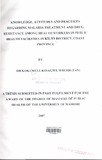| dc.contributor.author | Muli-kinagwi, K | |
| dc.date.accessioned | 2014-06-25T09:34:35Z | |
| dc.date.available | 2014-06-25T09:34:35Z | |
| dc.date.issued | 2007 | |
| dc.identifier.uri | http://hdl.handle.net/11295/71058 | |
| dc.description.abstract | Malaria is a disease caused by blood infection with protozoan parasites of
the genus Plasmodium, which are transmitted from one human to another by
the bite of infective female Anopheles mosquitoes. Malaria affects human
beings with either uncomplicated or severe presentations with fever as one
of the main symptoms.
Recently, the disease has shown srgns of defying treatment regrmes and
control through the conventional anti-malarial drugs. This development has
prompted malaria endemic countries to set new guidelines for treatment.
Adherence to these guidelines is considered critical in ensuring that the
malaria parasites remain sensitive to the drugs as well as slowing down the
development of resistance.
~his study was descriptive study and assumed a cross-sectional approach. It
was conducted among all the healthcare workers (HeW) based at the public
/
. health facilities who treat malaria cases in Kilifi District. The objective of
the study was to establish the knowledge, attitudes and treatment practices of
heath care workers in malaria and their relationship to drug use patterns,
which are associated with the development of drug resistance.
12
Data collection was conducted using a structured questionnaire, by adopting
an open and closed-ended questions format. Focus group discussions were
also utilised with a similar interview schedule. Data analysis was conducted
using the Statistic Package for Social Scientists (SPSS).
This study established that the level, of knowledge of malaria among the
HCW was adequate. The HCW were also knowledgeable about the factors
associated with the development of resistance. The majority of HCW were
also found to have positive attitudes to the new treatment policy. Some
IICW raised various concerns about the cost of the new treatment, issues of
compliance and increased workload. The majority of the J-ICW were also
found 1.0 have positive III 3 laria case management practices in rna laria. There
was a significant association between having a copy of the treatment guide
at the facility and ma laria case management practice.
This study also established that the HCW were not adhering to the
recommended treatment at the time of the study. In fact several treatment
violations were found out such as - the use of coartem as second line
treatment, continued use of Chloroquine, use of artemisinin monotherapy.
The public health facilities also do not adequately support the treatment
13
practices of the HCW because the majority of the respondents did not have
access to fully functional laboratories all the time as well as adequate
antimalarial supply all the time.
This study therefore recommends among others, that the government should
ensure that all facilities have copies of the treatment guidelines and that all
HeW should have access to regular training. It is also imperative for the
government to conduct regular monitoring and evaluation among HCW to
establish their treatment practices and ensure that they follow the national
malaria treatment guidelines. | en_US |
| dc.language.iso | en | en_US |
| dc.title | Knowledge, Attitudes And Practices Regarding Malaria Treatment And Drug Resistance Among Health Workers In Pulblic Health Facilities In Kilifi District, Coast Province | en_US |
| dc.type | Thesis | en_US |
| dc.description.department | a
Department of Psychiatry, University of Nairobi, ; bDepartment of Mental Health, School of Medicine,
Moi University, Eldoret, Kenya | |

